Reference
- Gaius Julius Hyginus, Fabulae from The Myths of Hyginus translated and edited by Mary Grant. University of Kansas Publications in Humanistic Studies. Online version at the Topos Text Project.
In Greek mythology, Aeopolus was the father of Cleobule (Theobule [1] ), one of the possible mother of Myrtilus by Hermes. He was also called Aeolus. [2] [3]

In Greek mythology, the Nereids are sea nymphs, the 50 daughters of the 'Old Man of the Sea' Nereus and the Oceanid Doris, sisters to their brother Nerites. They often accompany Poseidon, the god of the sea, and can be friendly and helpful to sailors.
In Greek mythology, Otrera was the founder and first Queen of the Amazons; the consort of Ares and mother of Hippolyta and Penthesilea. She is credited with being the founder of the shrine of Artemis in Ephesus.
In Greek mythology, Thaumas was a sea god, son of Pontus and Gaia, and the full brother of Nereus, Phorcys, Ceto and Eurybia.
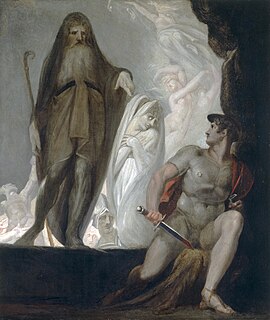
In Greek mythology, Anticlea or Anticlia was a queen of Ithaca as the wife of King Laërtes.
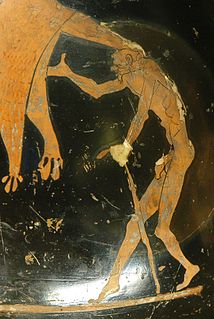
In Greek mythology, Geras, also written Gēras, was the god of old age. He was depicted as a tiny, shriveled old man. Gēras's opposite was Hebe, the goddess of youth. His Roman equivalent was Senectus. He is known primarily from vase depictions that show him with the hero Heracles; the mythic story that inspired these depictions has been lost.
Gaius Julius Hyginus was a Latin author, a pupil of the scholar Alexander Polyhistor, and a freedman of Caesar Augustus. He was elected superintendent of the Palatine library by Augustus according to Suetonius' De Grammaticis, 20. It is not clear whether Hyginus was a native of the Iberian Peninsula or of Alexandria.

Libya of Egypt is the daughter of Epaphus, King of Egypt, in both Greek and Roman mythology. She personified the land of Ancient Libya in North Africa, from which the name of modern-day Libya originated.
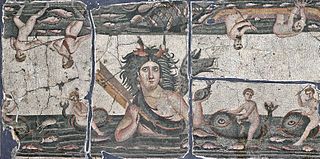
Thalassa was the general word for 'sea' and for its divine female personification in Greek mythology. The word may have been of Pre-Greek origin.
In Greek mythology, Aergia is the personification of sloth, idleness, indolence and laziness. She is the translation of the Latin Socordia, or Ignavia. She was translated to Greek because Hyginus mentioned her based on a Greek source, and thus can be considered as both a Greek and Roman goddess. Aergia's opposite character is Horme, a goddess of effort.
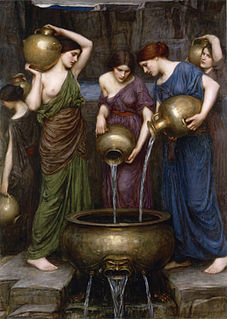
In Greek mythology, the Danaïdes, also Danaides or Danaids, were the fifty daughters of Danaus. In the Metamorphoses, Ovid refers to them as the Belides after their grandfather Belus. They were to marry the 50 sons of Danaus' twin brother Aegyptus, a mythical king of Egypt. In the most common version of the myth, all but one of them killed their husbands on their wedding night, and are condemned to spend eternity carrying water in a sieve or perforated device. In the classical tradition, they came to represent the futility of a repetitive task that can never be completed.
In Greek mythology, Epiphron ( was the daimon or spirit of prudence, shrewdness, thoughtfulness, carefulness, and sagacity. According to Hyginus, Epiphron was the son of Erebus and Nyx.
In Greek mythology, the Neikea were spirits of arguments, feuds, quarrels and grievances. Their Roman counterpart was Altercatio.
In Greek mythology, the Amphillogiai were goddesses of disputes and altercations. Their Roman counterpart was Altercatio.
In Greek mythology, the Hysminae or Hysminai are the personifications of fighting.
Argia, Argea, or Argeia may refer to several figures in Greek mythology:
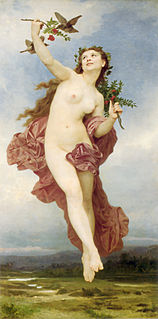
In Roman mythology, Dies was the personification of day. She was the daughter of Chaos and Caligo (Mist), and the counterpart of the Greek goddess Hemera.
Hybris was a spirit (daemon) of insolence, violence, and outrageous behaviour. In Roman mythology, the personification was Petulantia who reflected the Greek conception of hubris.
In Greek mythology, Electra was one of the 3,000 Oceanids, water-nymph daughters of the Titans Oceanus and his sister-spouse Tethys.
In Greek mythology, Ascalaphus or Askalaphus, was son of Ares and the Minyan princess Astyoche, daughter of King Actor of Orchomenus. Ascalaphus was also a king of the Minyans, and twin brother of Ialmenos. These brothers were counted among the Argonauts and the suitors of Helen, and led the Orchomenian contingent in the Trojan War, where Deiphobos threw a spear and killed him.
In Greek mythology, Amatheia was the "fair-tressed" Nereid and was described to have "azure locks luxuriant" or as some translations put it "long, heavy hair". As one of these 50 sea-nymphs, she was the daughter of the 'Old Man of the Sea' Nereus and the Oceanid Doris. Variations of her names were Æmathia, Amathea and Amathia which means "queen of voice".